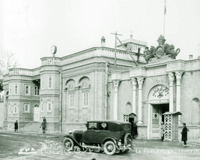Constitutional revolution was formed against the despotic Qajar system and its authoritarian administration. Following that, parliamentary procedure was started with the establishment of the National consultative assembly in 30th Dec. 1906 by Mozaffaraddin Shah’s decree, and with the ...
Constitutional revolution was formed against the despotic Qajar system and its authoritarian administration. Following that, parliamentary procedure was started with the establishment of the National consultative assembly in 30th Dec. 1906 by Mozaffaraddin Shah’s decree, and with the compilation of constitution and its amendments at the time of MohammadAli Shah in 9th Oct. 1907, it entered a new phase and a new spirit were blown into the body of country. Thus, a new organization called "the Nation’s House" or "National Council" was formed with the representatives of people, and it limited the unlimited advantages of the monarchy, and took hold of the Majlis.
In this revolution, media was one of the main organizational and advertising pillars. And it could be claimed that the press and journalists were the decisive weapons of constitutional revolution.
Thus, the national press which were published abroad before the Constitutional revolution, and were the main source of domestic and foreign news for the people and the revolutionaries, were transferred into Iran after the formation of Majlis.
In this period, the main topic of the country's press was personal freedom and press freedom. Under the principles of constitutional amendment, some rights and freedoms in favor of the individuals and citizens of the country were observed. And the principles 8 to 25 on the equality in front of law, private property and individual freedoms including personal freedom, labor freedom, business and trade freedom, liberty and freedom of trade, education and freedom of assembly, freedom of opinion and press freedom was paid.
Twentieth principle of the Amendment to the Constitution says:
All press except those misleading books and works which are harmful to Islam are free, and if anything forbidden or against the press law is released, they, the publisher or the writer will be punished according to the press law. If the author is famous and resident of Iran, the publisher and the distributer are inviolable.
In the thirteenth constitutional principle it is mentioned:
The negotiations of Majlis should be public so that the results of them should be carried out. According to the internal manuals of Majlis, journalists and spectators have the right to attend House hearings, without the right to take part in talks. The newspapers can publish all parliament negotiations without distorting the nature and meaning of them….
Therefore, the House was ordered to found the Majlis newspaper, in 24th Nov. 1906 in eight pages with lead fonts. In addition to the daily foreign and domestic news, the paper would cover all negotiations of the House. Each week four numbers were published.
The license for the publication of the newspaper was issued by Mozaffaraddin Shah for Mirza Mohsen Mojtahed in early constitutionalism, and its editorial manger was Seyed Mohammad Hosseini Tabatabaei, and its editor in chief was Adibolmamalek Farahani. The newspaper was free and was not subject to censorship.
https://iichs.ir/vdce.p8zbjh8nok1ij.html
iichs.ir/vdce.p8zbjh8nok1ij.html
